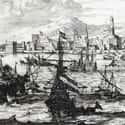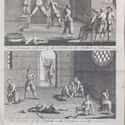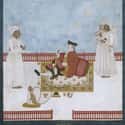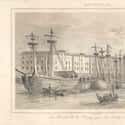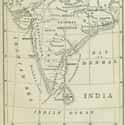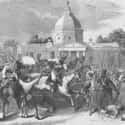-
(#1) The EIC Reportedly Offered The Sultan Of Achin A British Virgin For His Harem
As the British sought to out-explore and out-control other European countries, the East India Company used any means necessary to influence, control, and compel the governments they met to trade with them. In the early years of the 17th century, merchants from the EIC were purported to have offered the Sultan of Achin on the island of Sumatra a British virgin for his harem. King James I reportedly stepped in and stopped the exchange before it could happen, however.
-
(#2) The EIC Used Propaganda To Justify Conflicts With The Dutch
The "big three" in terms of exploration during the early 17th century - England, the Netherlands, and Portugal - competed heavily for land, trade rights, wealth and power. The Portuguese fell by the wayside pretty early on, which left the main rivalry between the East India Company of the British and the Dutch United East Indies Company (Vereenigde Oost-Indische Compagnie in Dutch, or VOC) to heat up quickly. The EIC and VOC engaged in military skirmishes - something both were empowered to do, given their mandates - but the war of words was just as vicious.
As part of this, the British, who were falling behind in the spice trade in the region, kicked off a propaganda campaign that destroyed the reputation of the Dutch in England and throughout Europe. In the 1630s, British pamphlets alleged horrible atrocities, described acts of extreme brutality, and contained images aimed at enraging the public.
In 1652, after England passed the Navigation Act meant to give the British an upper hand on sea trade, Oliver Cromwell ordered the pamphlet reprinted to justify going to war with the Dutch. The First Anglo-Dutch War, the first of four that took place during the 17th and 18th centuries, helped establish the dominance of the EIC in maritime commercial trade and imperial dominance.
-
(#3) The EIC Facilitated Opium Addiction In China
China was resistant to opening its ports and borders to European traders during 17th, 18th, and 19th centuries, but the British were determined to change that. In 1672, the EIC secured a trade headquarters in Taiwan and were soon able to venture to other Chinese ports to exchange goods.
During the 18th century, the EIC established a monopoly of trade in the East Indies, trading wool and Indian cotton for tea and silk. There was an imbalance of trade, however, as the Chinese needed far fewer British items than the British desired. As a result, the revenue stream of the British waned, and they turned to producing more opium in India. Opium, a crop used for medicinal purposes, was exclusively under the authority of the EIC.
Opium was banned in China in 1729 as an illegal drug and became a heavily moved underground product - in 1838, the opium black market's estimated value was in the millions. When the EIC lost its trade monopoly in China in 1833, numerous British companies began to import massive amounts of opium and traded opium instead of silver for Chinese goods.
Because opium was readily available, in large part due to the support from the EIC, more and more opium made its way into China - often via India - leading to widespread addiction, illegal use, and what many argued was social decay.
-
(#4) The EIC Bribed Anyone Who Could Get Them What They Wanted
In 1757, British general Sir Robert Clive fought against the Nawab of Bengal at the Battle of Plassey. The Nawab, a semi-independent leader in the east of India, was defeated and replaced with a puppet nawab, one more willing to let the British trade and control the area than his predecessor.
The treachery of the battle itself, however, was rooted in the bribes Clive's military paid to Mir Jafar, one of the high commanders of Nawab Siraj-uh-Daulah, as well as to the other Bengali soldiers. They were paid to stop fighting, surrender, turn on their fellow soldiers, and even join the British.
After the battle, Mir Jafar was made the next Nawab of Bengal. From this point forward, Clive essentially controlled Bengal.
-
(#5) The EIC Financially Crippled Existing Governments In India
After the Battle of Buxar on October 22, 1764, the British and the Mughal Emperor Shah Alam II signed the Treaty of Allabahad. The agreement gave the British rights to collect taxes on behalf of the Mughals - whom they were not protecting, according to the treaty - and basically set up British rule in the eastern province of India. The British paid a small sum to the Mughals but took most of the money for themselves.
Another part of the treaty required the Nawab of Awadh to pay millions of rupees in war indemnity, a sum they were unable to maintain, and by 1801, the British took control of the northern part of India as well.
-
(#6) Corruption And Brutality Within The EIC Was So Extensive That Parliament Intervened - Repeatedly
During the 1770s, the British government became increasingly frustrated with the corruption and mismanagement of the EIC. They implemented laws that gave the company regulated loans in exchange for authority over the EIC's territory. In 1784 and again in 1786, the British government passed additional laws giving themselves control over EIC appointments of officials and personnel.
In Parliamentary hearings about the EIC, Major Henry Munro testified about British efforts in India. According to his 1772 statement, conditions in India were tense and rebellions were common. Munro recounted one particular revolt from 1764 when rebellious sepoys, or native troops, were marched out in front of British troops, tied to cannons, and "blown away."
-
(#7) The EIC Set Their Officials Up For Some Serious Falls, But They Deserved It
Robert Clive rose to prominence in the EIC, especially with his successes at the battles of Plassey (1757) and Buxar (1765). His first governorship of the company until 1760 was a success in terms of securing land and relations with Indian governments, and he acquired a large amount of wealth for himself while entrenching Britain even further into Indian politics. Clive returned to England until 1765, when he again went to administer India. From 1765-1767, Clive reformed the administration and abuses that plagued the EIC and reestablished order in India, which had waned in his absence.
Clive's return to England in 1767, however, was met with resentment and criticism, especially given realizations about corruption and violence in the EIC's lands. When Clive testified in front of Parliament in 1773 to answer charges about the company's corruption, his enemies pounced. He argued that everything done under his watch was in line with company policy and he'd exercised "moderation." Some wanted to censure Clive for his part in the company's actions, but he was ultimately exonerated of any wrongdoing in 1773. Even so, the circumstances left him depressed and he took his own life in 1774.
-
(#8) Despite Parliamentary Reforms, The EIC Never Really Changed
In 1773, the British Parliament issued the Regulating Act, which aimed to correct the abuses of the EIC. Because Parliament had greater insight and control of elections and revenue in India, the EIC was, in theory, now held to a higher standard. Given the continued claims of torture and brutality by residents across the EIC strongholds, however, the reforms by Parliament failed to address the day-to-day cruelty committed by the company.
-
(#9) The EIC Tried To Save Itself With Tea
When the British Parliament granted the East India Trading Company a monopoly over tea sales to the Colonies, the idea was to help the EIC get out of debt. The 1773 establishment of the EIC monopoly gave the company large tax breaks as they no longer had to pay to take tea to the Americas from Britain.
Taxes on tea had been in place since the Townshend Act of 1767, but the monopoly of the EIC left the colonists with no say in the matter. This led to the famed Boston Tea Party, which, for the Sons of Liberty at least, was as much about tea as it was about being told what to do.
-
(#10) The EIC's Continued Use Of Torture Led To An Official Investigation And The 'Madras Torture Report'
In the 1850s, Parliament called for the EIC to conduct an investigation into the widespread and horrific claims of torture by people in India. The Madras Native Association petitioned the British Parliament and, when word of the atrocities hit the British and Indian press, calls for increased control of the EIC ensued.
The investigation led to a public document that is known as the Madras Torture Report.
-
(#11) The EIC Used Torture In Many Different Ways
In 1856, the Earl of Albemarle described numerous methods of torture reportedly used by the EIC's strong arms. According to his testimony, the EIC practiced:
...deprivation of food and water; hindering a man from sleeping; hanging a necklace of bones or other disgusting materials round the neck (a punishment peculiarly offensive to a Hindoo); compelling a man to sit on his heels, with brickbats or sharp stones under his hams; striking the heads of two defaulters against each other; tying two persons together in a stooping posture by the hair of their heads; tying a man in a stooping posture to the wheel of a cart; tying a man by the hair of his head to the tail of an ass, and parading him through the public market; forcing a man into a stooping posture with another man on his hack; binding a man to one tree and hoisting his leg by a rope attached to another; suspending a man by his heels to the bough of a tree; suspending him by the wrist, and scourging him while in the air.
-
(#12) The EIC Tortured Both Men And Women
According to the Madras Torture Report, no one was safe from the brutality of the EIC. When agricultural yields failed due to drought during the 1850s, local Indians were unable to pay their taxes to the company. The administration made peasants work extra hours in the extreme heat, on burning sand, with stones on their backs.
According to the same account, women were subjected to torture by kittee - the placement of a clamp - on their breasts.
-
(#13) The EIC Finally Went Too Far In 1857
The Sepoy Mutiny of 1857 brought out the worst in the EIC and ultimately led to its liquidation. Indian troops, or sepoys, that were in the service of the EIC revolted for a variety of reasons, including years of oppression and exploitation by the British. The immediate cause, however, was based in the type of rifle and ammunition cartridge the sepoys were required to use in 1857. The cartridges were coated in animal fat and contact with such a product was against both Hindu and Muslim law.
In the spring of 1857, open rebellion when sepoy troops attacked their British counterparts in and seized Delhi. Indians soon began attacking European men, women, and children and the revolt spread to three Indian provinces. The revolt continued for a year until July 1858 when peace was declared.
The brutal response by the EIC resulted in the deaths of hundreds of sepoys and other Indians. Sepoys were bayonetted or shot from cannons, and after the British retook Delhi in 1857, the Mughal emperor's sons and grandson were executed in cold blood before the emperor was sent into exile.
With long-standing criticisms of the EIC, this was Parliament's excuse to intervene once and for all and dismantle the company. The brutality and chaos on both sides of the revolt prompted the British government to take direct control of India in 1858. In 1873, the EIC legally ceased to exist.
New Random Displays Display All By Ranking
About This Tool
On December 31, 1600, Queen Elizabeth I of England granted BEIC a royal license granting it the privilege of trading in India. In fact, this license permits the East India Company to monopolize trading rights in India for 21 years. Over time, the East India Company established British India, from a commercial trading enterprise to the actual master of India.
In 1670, the East India Company gained more authority, with the rights to mint coins, command fortresses and troops, form alliances and declare war, and sign peace treaties. At this time, the East India Company actually had the function of a country and became the pioneer of the British Kingdom's colonization of the East. The random tool shares 13 worst things the Honourable East India Company ever did.
Our data comes from Ranker, If you want to participate in the ranking of items displayed on this page, please click here.











